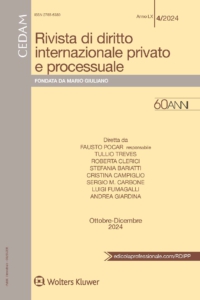Views
Same-sex relationships concluded abroad in Namibia – Between (Limited) Judicial Recognition and Legislative Rejection
There is no doubt that the issue of same-sex marriage is highly controversial. This is true for both liberal and conservative societies, especially when the same-sex union to be formed involves parties from different countries. Liberal societies may be tempted to open up access to same-sex marriage to all, especially when their citizens are involved and regardless of whether the same-sex marriage is permitted under the personal law of the other foreign party. For conservative societies, the challenge is even greater, as local authorities may have to decide whether or not to recognise same-sex marriages contracted abroad (in particular when their nationals are involved). The issue becomes even more complicated in countries where domestic law is hostile to, or even criminalises, same-sex relationships.
Cassirer on Remand: Considering the Laws of Other Interested States
This post is by Carlos Manuel Vázquez, a professor of law at Georgetown Law School. It is cross-posted at Transnational Litigation Blog.
Claude Cassirer brought suit in federal court in California eighteen years ago against the Thyssen Bornemisza Museum of Madrid, Spain, to recover a painting by Camille Pissarro that was stolen from his grandmother by the Nazis during World War II. After a reversal and remand from the U.S. Supreme Court last summer, the case is now before the Ninth Circuit for decision of the legal question that is likely to be decisive: which law governs?
The district court and the court of appeals have so far framed the issue as a binary choice: the governing law on the merits is either that of Spain or that of California. I suggest here that the issue is better framed as a choice between the law of Spain, on the one hand, and the laws of all the other states or countries with connections to the dispute, on the other. (Disclosure: I submitted expert declarations in support of the plaintiffs on issues of public international law during earlier phases of this case.)
The U.S. Court of Appeals for the Ninth Circuit has affirmed the district court’s holding that, under the law of Spain, the plaintiff loses because the museum acquired title to the painting through adverse possession (otherwise known as acquisitive prescription). It is equally clear that, under the law of California, the plaintiff would prevail because California does not recognize the acquisition of title to moveable property through adverse possession. What has so far not featured prominently in the courts’ analyses of the choice-of-law issue is that the plaintiff would also prevail under the laws of all the other jurisdictions that have relevant connections to the dispute. Under governmental interest analysis, this should be central to the analysis. Read more
Review of: PP Penasthika, Unravelling Choice of Law in International Commercial Contracts: Indonesia as an Illustrative Case Study (The Hague: Eleven Publishers 2022)

Very recently, Indonesian private international law has attracted significant scholarship in the English language.[1] Dr Penasthika’s monograph (‘the monograph’)[2] is one such work that deserves attention for its compelling and comprehensive account of choice of law in international commercial contracts in Indonesia. My review attempts to capture the methodology, summarise the contents, and give a verdict on the quality of this monograph.
News
Choice of Law in the American Courts in 2024
The thirty-eighth annual survey on choice of law in the American courts is now available on SSRN. The survey covers significant cases decided in 2024 on choice of law, party autonomy, extraterritoriality, international human rights, foreign sovereign immunity, adjudicative jurisdiction, and the recognition and enforcement of foreign judgments.
This annual survey was admirably maintained by Symeon Symeonides for three decades. The present authors are pleased to have extended this tradition.
HCCH Monthly Update: January 2025
Conventions & Instruments
On 1 January 2025, the 2005 Choice of Court Convention entered into force for Switzerland. At present, 36 States and the European Union are bound by the 2005 Choice of Court Convention. More information is available here.
On 12 January 2025, the 2007 Child Support Convention entered into force for Cabo Verde. At present, 52 States and the European Union are bound by the 2007 Child Support Convention. More information is available here.
Rivista di diritto internazionale privato e processuale (RDIPP) No 4/2024: Abstracts
 The fourth issue of 2024 of the Rivista di diritto internazionale privato e processuale (RDIPP, published by CEDAM) was just released. It features:
The fourth issue of 2024 of the Rivista di diritto internazionale privato e processuale (RDIPP, published by CEDAM) was just released. It features:
Francesca C. Villata, Professor at the University of Milan, On the Track of the Law Applicable to Preliminary Questions in EU Private International Law [in English]
Silenced, if not neglected, in (most) legislation and practice, the issue of determining the law applicable to preliminary questions is a constant feature in the systematics of private international law (“p.i.l.”).


